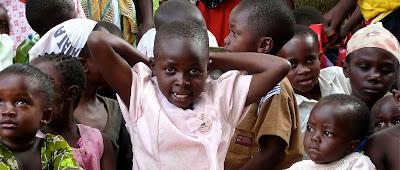
Here are a couple of amazing opportunities to go and "feel" Africa for yourself. These expeditions are led by amazing women who have been to Africa many times and will lead you through with grace and confidence. The trips are planned through RTC, Reach The Children, a great non-profit led by in-country heroes. Both of these expeditions will implement our "Grow. Learn. Give." program. Here is the info:
May 5th expedition:
The goal of RTC expeditions is 1) to support the organization's mission of facilitating self-reliance in communities dedicated to the well-being of underprivileged children, and 2) to give people with a desire to serve an opportunity to participate in various life-changing experiences.
May 2010 presents an opportunity to participate in a Reach the Children volunteer service expedition in Kenya. The focus of this expedition will continue and expand the teaching of square foot gardening and related nutrition, health, hygiene, and sanitation in schools and communities of Western Kenya. Additional forms of service will also be provided to a school and the children of a slum community in Nairobi, Kenya. In response to evaluated and approved requests from Kenya, projects will be more narrowly defined as the skills & experience of accepted applicants are reviewed and the team is formed.
Patty Liston (RTC's Director of Women's Initiatives) and Karen Bastow (Director of Agricultural Interests/Garden Specialist) are the team leaders of this 2 week expedition. We invite you to share our perspective that uplifting even one person makes the world a better place. Come join us--you'll be forever changed, too! Placement on the team roster is on a first come, first served basis of accepted applications. Space on this small team is limited, so if you are interested please do not procrastinate contacting us!
RTC (a 501c3 non-profit organization) expedition expenses are covered through donated funds. Each team member is responsible to make sure a minimum of $3950.00 has been donated to cover their expenses--which include the following as arranged for the team by RTC: airfare between approved US departure cities and African destination, team transportation in Africa, team lodging in Africa, all meals with the team in Africa, daily bottled water in Africa, team activities, and contributions to team projects*.
Apply online now. There is no obligation with an application, but it does offer team leaders the opportunity to review the information you provide and communicate with you about the team being developed
RTC (a 501c3 non-profit organization) expedition expenses are covered through donated funds. Each team member is responsible to make sure a minimum of $3950.00 has been donated to cover their expenses--which include the following as arranged for the team by RTC: airfare between approved US departure cities and African destination, team transportation in Africa, team lodging in Africa, all meals with the team in Africa, daily bottled water in Africa, team activities, and contributions to team projects*.
Apply online now. There is no obligation with an application, but it does offer team leaders the opportunity to review the information you provide and communicate with you about the team being developed
June Expedition:
In late June, Pat Jones (Director Expedition Dept.) and Michelle Cotton (Expedition Dept. Director of team development) will lead a team of volunteers to serve in East Africa for 2 1/2 weeks alongside the lovely people of that region. This team will continue the two-fold purpose of RTC expeditions to support the organization's mission of "facilitating self-reliance in communities dedicated to the well-being of underprivileged children," and to give people with a desire to serve an opportunity to participate in various life-changing experiences.The main projects on which this general service team will focus are currently being determined by RTC's native leadership in Kenya as they respond to local requests of communities in need. Typical efforts include aid to schools and communities in the areas of health--particularly dental and personal hygiene, basic first aid and nutrition--namely through education, "training the trainers," as well as individuals. Additional support is often provided in the way of building/enhancing learning centers in schools and communities to support the continuation of education, learned skills, etc. Some resources are shared to strengthen and encourage this education and efforts toward improved self-reliance. Projects become more narrowly defined as the skills and experience of accepted applicants are reviewed and the team is formed. Volunteers are oriented and prepared over time as they become part of the expedition team.
We invite you to share our perspective that uplifting even one person makes the world a better place. Consider joining us--you'll be forever changed, too! Space for this unique team is limited. Placement on the team roster is on a first come, first served basis of accepted applications.
RTC (a 501c3 non-profit organization) expedition expenses are covered through donated funds. Each team member is responsible to make sure a minimum of $3950.00 has been donated to cover their expenses--which include the following as arranged for the team by RTC: airfare between approved US departure cities and African destination, team transportation in Africa, team lodging in Africa, all meals with team in Africa, daily bottled water in Africa, team activities, and contributions to team projects*.
RTC (a 501c3 non-profit organization) expedition expenses are covered through donated funds. Each team member is responsible to make sure a minimum of $3950.00 has been donated to cover their expenses--which include the following as arranged for the team by RTC: airfare between approved US departure cities and African destination, team transportation in Africa, team lodging in Africa, all meals with team in Africa, daily bottled water in Africa, team activities, and contributions to team projects*.
Apply online now. There is no obligation with an application, but it does offer team leaders the opportunity to review the information you provide and communicate with you about the team being developed.






